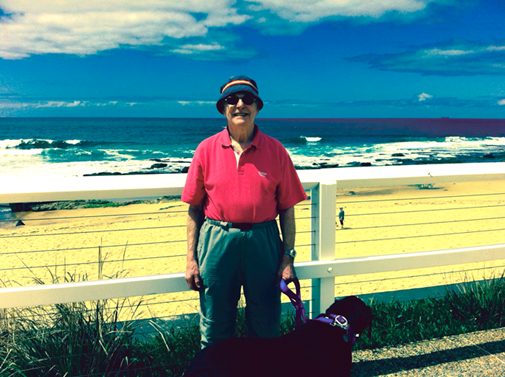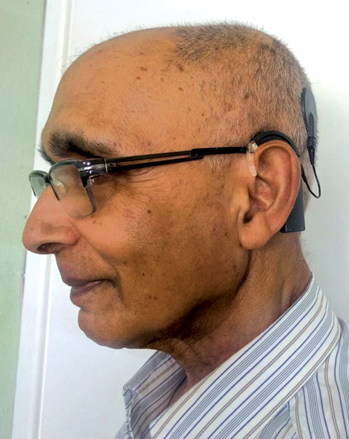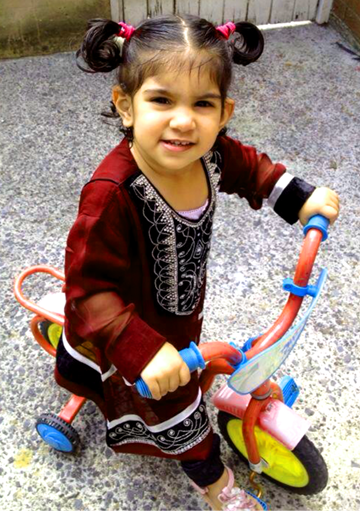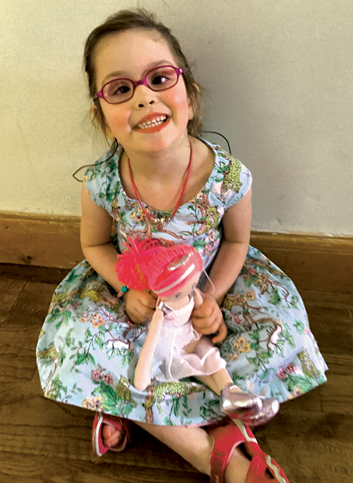The most powerful evidence for the remarkable achievements made with cochlear implants over 40 years comes from the life-changing, personal stories of those who have benefited from the technology.
James Rylance
I first noticed a problem with hearing when I was 21. It was after I had played a tough rugby game and, mistakenly, I thought it was due to getting a kick on my head. The ENT consultant I then saw quickly changed my mind when he said, “You have nerve deafness, young man; there is no cure for it. It will be a problem for you when you are about 50. So, go away, don’t drink, don’t smoke, don’t keep late nights!” (Remarkable advice for a young man – who took little heed of it!). But I did go to lip-reading classes and I still find the benefit of that training.
Later, I deduced that the cause of my deafness was either a life-threatening childhood illness I experienced when I was five, or the early sulphonamide drug which cured me, as the drug was later found to attack the hearing nerve.
The first diagnosis was remarkably accurate: I did, indeed, find listening was a problem when I got to be 50. I needed hearing aids (two aids, because each ear was equally bad). I had to give up my job as a client-side project manager leading a team of architect and engineer designers, but I was fortunate in having qualified as a chartered surveyor in two disciplines, (quantity surveying and project managing), so I reverted to being a quantity surveyor member of the design team, although I didn’t enjoy it as much.
I transferred from the RNTNE in London to the Manchester Royal Infirmary (MRI) for a cochlear implant assessment. Following a lengthy assessment, I was offered an implant by Professor Richard Ramsden and received it at MRI in April 2000, when I was 65. My life was transformed! And so was my wife’s!
‘Switch-on’ of the implant was both marvellous – I was hearing! – and awful, because the world was so loud. It was a steep learning curve in the first few months but I even found that I was still noticing improvement after eight years of use.
Nine months after receiving my first implant, Prof Ramsden offered me an implant in my other ear in return for taking part in a Europe-wide study to see if two are better than one, and so I received a second implant in March 2001. I could immediately say, “Yes, two are better than one”, and I did, and continue to do, enthusiastically. Importantly, I could now go back to my job as a project manager and I have an estimate (mine) of 95% hearing, which gives me pleasure every day.
Nilay Mukherjee
It was my Eureka moment – “Hello Nilay, Can you hear me?” said the audiologist after switching on the processor. She was sitting about one metre away. Suddenly I heard a voice in the implanted ear and understood what she was saying. So I repeated, “Did you say can you hear me?” I enthusiastically replied, “Yes, I can hear you”. I was so overjoyed, as if I had achieved an enormous goal. Ok, the quality of the sound was nothing like normal. However it was a big morale boost for me because I then had the peace of mind that the operation, which was done on 20th November 2015, had been successful, and my journey to the world of understanding sound had begun again at the age of 72.
Monika, my wife, was sitting about two metres away to witness the wonderful event, which opened the world of audio communication (sound and understanding) again to me. After talking to me for a few minutes, the audiologist left the room leaving me and Monika in the room to talk amongst ourselves, which was a wonderful idea. I could understand most of her words.
I could see the smile on her face.
All this happened on 21st December 2015, so it was like a Christmas present for me from the NHS, and what a present it was!
I started to notice my hearing difficulty around 1987 when I was still working. After a few appointments, I was fitted with a hearing aid in November 1989 on my left ear. A second hearing aid was fitted on my right ear in September 1996.
After managing with two hearing aids for about 15 years, I found it difficult to understand words and sentences. It was especially noticeable during telephone conversations. On occasions, I couldn’t identify myself to the bank over the telephone and I had to go personally to the bank branch with my passport and residential proof to sort out my identity and unlock my account.
While playing badminton at a sports club, I noticed someone with a cochlear implant. Taking him to a quiet corner, I started chatting to him and found that his situation was very similar to mine before his implant and he was very happy with his implant. That gave me a ray of hope and I approached my GP to enquire about it and I was seen in the Manchester Implant Centre.
Life now is a lot better and I feel confident going out on my own and manage to communicate with people at the bank or post office counters. I still can’t use the landline telephone. The main problem now is being in a noisy and crowded atmosphere. One to one conversation I manage 95% of the time. If I meet someone with an accent or who talks very fast, then it becomes difficult to communicate.
Aisha Parveen
I still remember it like it was yesterday, October 19th 2011. Aisha was born by emergency C-section. A little girl after 16 years of waiting. The next day I was wheeled to the neonatal intensive care unit (NICU) to see my princess, instead I saw a little precious doll with all these wires sticking into her in a ‘box’. I don’t have words for what I was thinking and going through. Little did I know that the journey had just begun.
Aisha spent 10 days in NICU, and on the tenth day when she was ready to be discharged a nurse came from Newborn Hearing Screening to check her ears. No response is what she got. I was told it was probably fluid on her ears and that an appointment for local audiology would be sent in the post. Finally, I was able to take my daughter home and enjoy her.
At home I would put her down and as soon as she realised this she was awake crying and screaming. I was beginning to get frustrated and upset that I was unable to look after her. Maybe it had to do with the 16-year gap between my eldest Zeeshan and Aisha. Surely no one can cry for that long. Aisha would cry when the lights were out or she would feed all night. What was I doing wrong?
When Aisha was six weeks old I received an appointment to attend the audiology department at our local health centre. I asked my sister to accompany me. Aisha was fast asleep when the ABR test started. More tests, the two audiologists were talking amongst themselves looking worried but smiling at us all the time. After two hours, I was told that Aisha was likely to have a profound hearing loss. We were given an appointment to be seen the following day for further tests. I was asked if I needed any support. At the time all I could think was that my younger sister had hearing problems when she was born and after a short while the fluid had cleared on its own. Aisha would be fine. The audiologists didn’t understand how I was taking it so well and asked if I wanted to speak to someone. I refused and went home.
The appointment the following day confirmed our fears. Aisha was indeed profoundly deaf; she would have to wear hearing aids. What did that mean for me as a mother? What would happen to Aisha in terms of her speech? Would Aisha be able to speak? I cried on the journey home not knowing what to say or do.
Aisha was fitted with hearing aids and we were introduced to our teacher of the deaf, who has been excellent in helping us through Aisha’s hearing impairment. When Aisha was six months old I was asked if I would like her to be referred to the cochlear implant programme. What were they and how would they assist Aisha in her hearing?
I travelled to the implant programme with my brother and husband and met a wonderful team who made me want to have this amazing technology fitted the same day. Aisha would finally be able to hear me. After more appointments we were given a surgery date of November 5th 2012. Two weeks after her operation she had her right implant activated. She had the volume adjusted and I was told to slowly increase the volume via the remote until I was next seen again. I played music in the car travelling home, waiting for a reaction from her. I couldn’t see a response so I continued to increase the volume. Nothing. She had fallen asleep and I put her down on the sofa. My nephew had been playing outside ran inside and slammed the door behind him. Aisha jerked and awoke. Wow! It worked. She could finally hear.
The left implant was activated a few weeks later and we had more appointments with the implant programme to adjust the volume and for speech and language therapy. I attended them all and after a year could see the difference. I felt safer – safer that Aisha was becoming a successful hearing child.
Grace Wilson
Our daughter Grace was born on 26th February 2012 at 37 weeks. Several hours after birth, she was taken to the intensive care unit, due to sepsis and was ventilated. She suffered a rare brain injury called kernicterus, secondary to jaundice. This resulted in a diagnosis of athetoid cerebral palsy and auditory neuropathy spectrum disorder.
Grace was monitored closely with regular hearing tests and fitted with hearing aids. Unfortunately the hearing aids did not help her hearing and she was offered bilateral cochlear implants. We were keen for her to undergo surgery, to have the opportunity to hear.
Just before her second birthday Grace received her cochlear implants. Initially there were several challenges that we faced. As Grace had poor head control, it was difficult to keep the coils attached to her head. She also wears glasses, so we had to find a way to keep these on with her processors. With regular speech therapy appointments and sessions with her teacher of the deaf, Grace began to recognise sounds and words and has gradually developed her speech. Grace is now five years old and attends mainstream primary school with an onsite deaf base. She can hear all speech sounds and is developing her speech. She is an extremely happy, confident and independent little girl, who has undoubtedly benefitted from her implants.
Without the use of implants Grace would have faced more challenges. Her cerebral palsy affects her coordination. Therefore forming accurate signs to communicate with can be difficult for her. Using her implants, Grace can hear, speak and back up her language with sign, rather than sign language being her primary mode of communication. Her speech clarity is also affected by her cerebral palsy, but with her implants providing the ability to hear speech sounds, Grace’s speech is improving all the time. This enables people unfamiliar with Grace to understand what she is saying.
Through the amazing support and care of the implant and sensory support service staff, Grace is making amazing progress and we are thankful that Grace was given the opportunity to have cochlear implants.
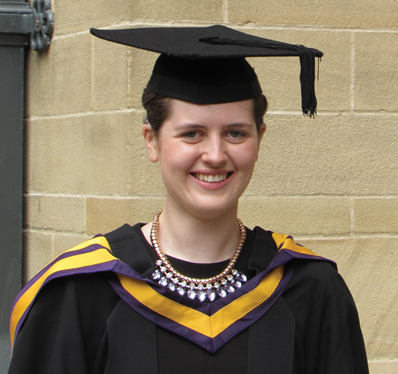
Georgina Grimshaw
I’m Georgina, I’m 24 years old. At two years old I was diagnosed with a profound bi-lateral sensori-neuraI hearing loss. I was fitted with hearing aids immediately but I was too deaf to benefit very much from these, I needed something much more powerful to give me good access to sound and help me get good language. I was assessed as a suitable candidate and I had my first cochlear implant aged four.
My parents were very relieved that I had been able to get the implant. With access to the hearing world through my implant I was able to attend mainstream school and I went on to do well with my GCSEs and A-levels. At 17 I was asked if I would like to be assessed for a sequential implant. I was pleased to get this chance because I knew how successful my first implant had been. Two days after my 18th birthday my second implant was switched on. Initially it sounded rubbish. I couldn’t recognise sounds or words it was just noise. With help from the implant team tweaking my map and speech therapy exercises to practice, it was soon useful and was a good decision. It helps me in terms of knowing which direction sounds are coming from. I don’t tire as quickly and it is easier when following conversations.
After having my bilateral implants, I was lucky enough to be awarded the Graeme Clark Cochlear Scholarship in 2012 which was a great honour. I went to university and achieved a first class Master’s degree in Chemistry from the University of Manchester.
“The advancement of cochlear technology in my lifetime has been truly life changing.“
Having implants has given me confidence to be a member of many clubs. I currently teach at the local lifesaving club and I am a member of a local sailing club, helping out, sailing and windsurfing. I’m now working as a research chemist in the chemicals industry which is what I aspired to do. As part of my job, I have many opportunities to expand my knowledge of chemistry and I also get to travel to meet clients.
Thirty years ago my life would have been so different. I was born deaf into an ordinary working class family who had no understanding of deafness. Studying chemistry at university would have been impossible. The advancement of cochlear technology in my lifetime has been truly life changing. For example, when I had my first implant the operation was quite long and it took me a little time to recover. When I had my second implant as a day patient I went into hospital at 7am and was home by 7pm. My first speech processor was a box worn on my chest and now all the technology is behind the ear. We even have waterproof technology!
This advancement has been possible because of all the scientific research and hard work from the professionals and I am sure there is more to come in my lifetime and beyond...
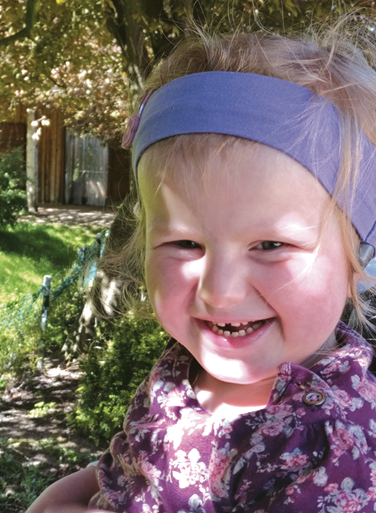
Emily Treharne
When you decide to have a baby the only things you want to consider are baby names, what to buy and how to decorate the nursery. So when things don’t go to plan and you are forced to consider things not listed, you are left in an uncertain world. Our daughter, Emily, was born unexpectedly five weeks early and quickly became very unwell with sepsis and meningitis. We were in hospital for a month before coming home and then the numerous and frequent hospital appointments started.
One of these was a ‘routine’ hearing test that led to a diagnosis of bilateral profound hearing loss. As shocking as this finding was at the time, looking back it was novel to go to an appointment and get a definite answer; a black and white situation. We were told Emily couldn’t hear, but her other health needs were uncertain. Paediatricians could tell us the severity of the infection, about the bleed and fluid on her brain, and that she had already missed several milestones; but they couldn’t answer our questions about her future.
When faced with uncertainty you weigh up each decision as it arises, as planning is impossible. One decision we had to make was whether Emily should have cochlear implants. When we started discussing this option with the specialist team they were, again, unable to tell us what these fancy looking hearing aids would be able to offer our daughter. The aim would be for her to develop understanding of spoken language and speak herself, but given her other unknown developmental problems was this being too optimistic? We decided that given Emily’s uncertain future we had to make decisions for her that may be of benefit and possibly enrich her life. She therefore received two cochlear implants at 11 months old.
Our hope was that the implants would give Emily access to sound to gain awareness of her environment and get enjoyment from this. I don’t think we considered the massive impact these bundles of technology could have. By hearing sounds around her she started looking around and turning, with her head control improving daily. She was drawn towards musical instruments and familiar noises and started rolling, then crawling, then trying to walk towards these intriguing new experiences. Sharing books she was eager to try to turn pages herself to hear of new adventures. She found she could communicate what she wanted by pointing in response to questions, developing to ‘yes’ and ‘no’ and now to single words and short phrases.
All children with additional needs have their individual potential and we have to work hard to achieve this, but I know that without the access to sound that her implants have provided, her development would have been slower or halted. Over the two years she has had them they have developed her understanding and language, but also her motor development, interaction with peers and general wellbeing. The future is still uncertain but she’ll be facing it as noisily as possible!

